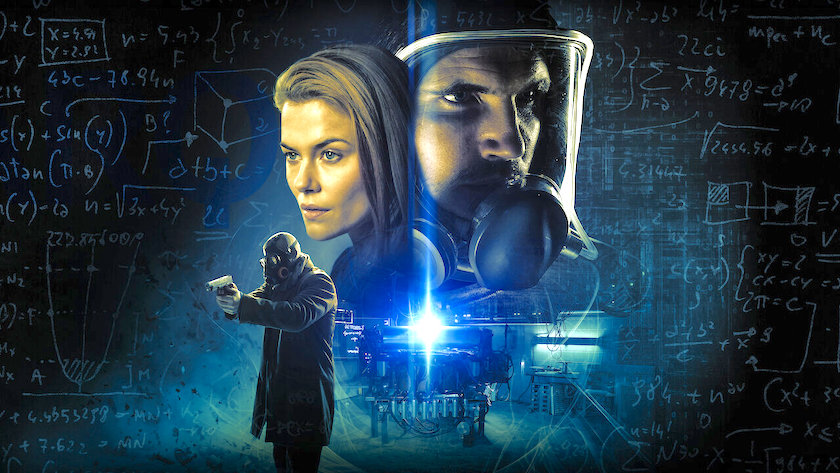
[Review by Vanessa Jones].
Time travel is a well-worn concept, so it’s a rare treat to find a fresh approach like Netflix‘s sci-fi movie ARQ. Written and directed by Tony Elliot – of Orphan Black fame – with a modest budget of less than $2 million, it delivers novel ideas and unpredictable plot twists.
ARQ jumps straight into the action. There’s barely time for a breath before masked men burst in the bedroom of rogue scientist Ren (Robbie Amell), threaten his girlfriend Hannah (Rachael Taylor) and demand money. When things go wrong and Ren starts re-living the same few hours over and over, he realises they’ve somehow entered a time loop.
In less capable hands, the lack of set up would be baffling and frustrating. But Elliot is superbly good at delivering information in passing, never spelling anything out. In many ways it resembles Mad Max: Fury Road‘s style of storytelling: scraping away everything except the absolute basics while dragging the audience on an adrenaline-pumped ride. As each loop unfolds, more information is uncovered that builds upon the last and further ups the stakes.
The small budget is used to absolute efficiency, with characters confined to the same concrete walls for most of the movie. Yet even this limitation is used to advantage, imposing a claustrophobic feeling that reflects the trap of the time loop. It’s a technique that’s arguably more effective than those of better funded movies like the similarly premised Edge of Tomorrow. Instead of epic open-air battles easy to disconnect from, ARQ takes place in a suffocatingly small space.
The nature of the trap is also a different, more poignant one. As the film progresses, it becomes clear that it’s not just the time loop keeping the characters trapped; it’s also their own decisions and obsessions. Robbie Amell (The Flash, The Tomorrow People) aptly conveys the mean streak in a man that’s given up on the world, while Rachael Taylor (Jessica Jones, Crisis) gives a fantastic performance as the broken, angry Hannah, who desperately wants to save it. Their clash in ideologies leads to an ending that is either horrifying or uplifting, depending on your point of view. Like the spinning token in Inception, the significance is eternally subjective.
If there is anything to criticise about ARQ, it’s the rather far-fetched notion of someone accidentally creating time travel. However, it doesn’t matter, as the premise is just a springboard for the more interesting question of what you do with time travel once you have it. There’s also the brief blip of unconvincing CGI at the end, but the film doesn’t waste more than the blink of an eye on it. Unlike so many other films, ARQ uses the special effects to enhance the plot, not the other way round.
Ultimately, that is the secret of ARQ’s success. ARQ might not have fancy special effects or household name actors, but it pours everything into creating a strong story. The characters are sympathetic, their dilemma riveting, and there’s not a boring moment to be found.

‘ARQ’ can be seen on Netflix right HERE.









